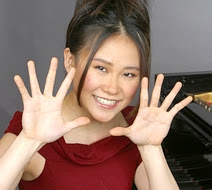 On Saturday, 20-year-old pianist Yuja Wang surpassed the buzz preceding her Washington Performing Arts Society performance at the Kennedy Center Terrace Theater. In a concert sold out since last spring, the Chinese-born American-trained pianist played works by Hungarian composers Ligeti, Liszt, and Bartók, balanced by the unique colors of Scriabin and Ravel. Intermission chit-chat following Liszt’s monumental Sonata in B Minor revealed that Wang has already been labeled as “the next Argerich.” Further conversation the following day indicated that perhaps she already is. Why this young pianist over others?
On Saturday, 20-year-old pianist Yuja Wang surpassed the buzz preceding her Washington Performing Arts Society performance at the Kennedy Center Terrace Theater. In a concert sold out since last spring, the Chinese-born American-trained pianist played works by Hungarian composers Ligeti, Liszt, and Bartók, balanced by the unique colors of Scriabin and Ravel. Intermission chit-chat following Liszt’s monumental Sonata in B Minor revealed that Wang has already been labeled as “the next Argerich.” Further conversation the following day indicated that perhaps she already is. Why this young pianist over others?Wang impresses by her natural intellectual capacity to express musical structure in combination with powerful technique. While marveling at the immediate demands of the Liszt sonata, the audience could also experience Wang’s care in shaping short phrases, sections, and the proportional arch of the entire work, climaxing at the gigantic modulation before the fugue. Most players, especially in a work like the Liszt Sonata, are more or less consumed by the immediate technical demands, which directs the audience toward musical immediacy rather than the musical whole. The short, opening B's had a forbidding edge, while one heard harmonic motion painted in the barrages of octaves. Wang’s sparse pedaling forced her to reach goals of clarity through exploitation of resonance within the instrument and acoustic of the room. Furthermore, Wang’s keen sense of forward motion pulled the audience onward, neither upsetting relationships of tempo nor giving the sense of speeding -- though the fugue was brisk -- since modifications were interwoven so subtly over large phrase structures.
Anne Midgette, Pianist Wang, Putting Herself On the A-Liszt (Washington Post, January 28) One Hundred Pages of Music, No Problem (Washington Post, January 8) |
Rarely leaving space between individual movements or works, Wang relished the persistent rhythms and folk motifs found in Bartók’s Sonata for Piano. Her rendition of Scriabin’s Sonata No. 2 in G# Minor (“Sonata-Fantasy”) conveyed an extemporaneous gentleness, always contained and beautiful. This contrasted well to the motoric ground patterns of Ligeti’s Etude for Piano No. 4 which opened the program. The Etude No. 10: The Sorcerer’s Apprentice featured a texture of fluttering repeated notes from which long notes eventually – and magically – emerged. Wang brilliantly kept the violent undercurrent of Ravel's La Valse behind an idealistic facade of light waltzing – most performers approach this work as a toccata.
Mozart-Volodos, Rondo alla Turca, played by Yuja Wang
Wang’s first encore, Gluck’s Melodie, was rather soupy, though her second and third encores were delightfully trashy enough to make Earl Wilde proud. Volodos’s version of Rondo alla Turca opens with a few bars of basic Mozart before launching into an incredible Rachmaninoff-esque charade. Equally fun, Cziffra’s double-octave arrangement of Flight of the Bumblebee reportedly led Wang to mention in the Q&A that it was "one big-ass bumblebee."
The next concert sponsored by WPAS is not to be missed, the visit of the Royal Concertgebouw Orchestra (February 3, 3 pm). Also, Yuja Wang will play Prokofiev's first piano concerto with the Baltimore Symphony Orchestra in late April (April 24, Strathmore; April 25 to 27, Meyerhoff).
Anne Midgette raved about this recital, too, and the clips I have heard have been impressive. Since I billed this as a Curtis-Juilliard showdown, with Wang facing off against Adam Neiman (last week), it looks like Curtis wins this round.
ReplyDeleteYW will also premiere the new Higdon Piano Concerto after Lang-Lang backed out of the already-agreed upon premiere.
ReplyDeleteYuja is truly an amazing talent and her music will resonate for decades to come.
ReplyDelete